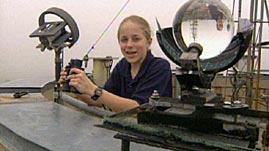Teachers' Domain - Digital Media for the Classroom and Professional Development
User: Preview


Source: ZOOM
People benefit from the work of meteorologists on a daily basis. Weather forecasts enable you to plan everything from what you'll wear to whether weekend activities should be indoors or outdoors. But when severe weather approaches, meteorologists serve what is perhaps their most important function in society. In this adapted video segment from ZOOM, one student describes how her interest in observing the weather led her to volunteer at a local weather center where she gains hands-on experience with weather instruments and learns from a practicing meteorologist how weather forecasts are made.
Weather is the state of the atmosphere at a given time in a particular place. Through the ages, people's fascination with the weather has generated a wide variety of ideas about its causes, as well as schemes to both measure and predict it. For the ancient Greeks, logic gained through experience was used to explain the weather. Not until the seventeenth century did scientists such as Galileo and Torricelli invent tools, versions of which are still used today, to measure the three key elements of weather: air temperature, air pressure, and humidity.
A thermometer measures air temperature -- the average speed of molecules of the gases in a quantity of air. A barometer measures air pressure -- the weight per unit of area of a vertical column of air that extends from the measuring device to the top of the atmosphere. A hygrometer measures humidity -- the amount of water vapor in the air. In the twentieth century, with the introduction of hot air balloons, airplanes, and high-tech instruments such as Doppler radar and satellites, weather prediction became far more sophisticated.
The word "meteorologist" comes from the Greek word "meteorol," which refers to something that happens high in the sky. A meteorologist is someone who studies the atmosphere and atmospheric phenomena. Today, meteorologists work in the government, the military, and the private sector, and communicate vital, up-to-the-minute information concerning daily weather conditions as well as potentially deadly events such as hurricanes, tornadoes, blizzards, and heat waves. Career options include weather forecasters, who make predictions from various raw data; television meteorologists, who make forecasts then use graphics to present these forecasts on air; consulting meteorologists, who work with insurance companies and other industries whose business can be affected by weather; and climatologists, who study past weather records to help predict future weather.
Because the study of weather includes chemistry, physics, and dynamics, anyone interested in pursuing a career in meteorology needs a strong foundation in high school math and science courses. The basic college degree required for aspiring meteorologists is a four-year Bachelor of Science in meteorology or atmospheric sciences. Graduate-level study and teaching or research experience also help.
 Loading Standards
Loading Standards Teachers' Domain is proud to be a Pathways portal to the National Science Digital Library.
Teachers' Domain is proud to be a Pathways portal to the National Science Digital Library.
